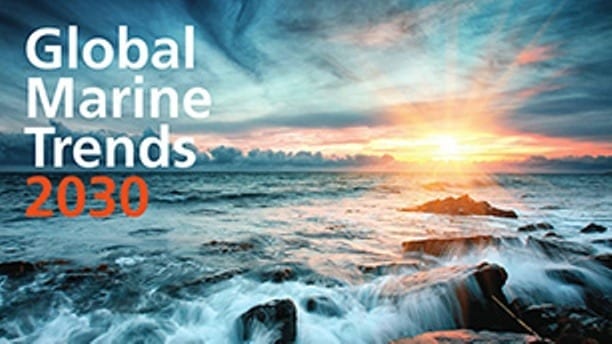
A greater understanding and appreciation of our oceans is essential for the wellbeing of the world’s population, according to the Global Marine Technology Trends 2030 (GMTT 2030) report.
The report is the culmination of a collaborative project between Lloyd’s Register, Qinetiq and the University of Southampton looking at the future for: commercial shipping – without which world trade would cease; for navies – so vital for security; and the health of the oceans – addressing the challenges of pollution, climate change and exploitation of resources.
In asking ‘what’s next’ GMTT 2030 is an aid to business, policy makers and society in trying to understand the future for the maritime industries and the oceans. Get your free copy of the report here.
Leading the ‘Ocean Space’ section of GMTT 2030, experts from the University’s Southampton Marine and Maritime Institute (SMMI) report that since the start of the Industrial Revolution, there has been a 30 per cent increase in ocean acidity and that 25 per cent of atmospheric CO2 is absorbed by the oceans. In addition, some 16 per cent of global protein intake comes from fish with an increasing amount of the world’s medicines, materials and energy also derived from the oceans.
By the year 2030, the experts forecast that twice as many offshore structures will exist including 100 times more wind turbines than at present, and that 50 per cent of the world’s oil will be produced offshore. They also predict that within the next 15 years, 50 per cent of the global population will live in coastal regions.
To mitigate against these effects and to develop opportunities for the future, they’ve identified a number of key transformational Ocean Space technologies that will make the biggest impact now and in the future. These include:
• Advanced materials – rise in the use of ultra-strong materials for ocean structures using embedded sensors to enable remote sensing and support the ability of materials and structure systems to self-repair when damage occurs;
• Big data analytics – extracting and using complex data from activities such as resource extraction, exploration and environmental protection to influence the way humankind perceives and interacts with the oceans;
• Sustainable energy generation – offshore energy-generation platforms and algae stations will reduce the consumption of fossil fuels, mitigate pollution and have a minimal carbon footprint, so their impact on the environment will be relatively small.
The combined use of these technologies, say experts from the SMMI, will help the world address the effects of climate change, the higher expected frequency and severity of extreme weather, the further reduction of land-based resources and the increasing coastal populations.
Read more: Understanding the world’s oceans more essential than ever to secure the future of our planet
The Latest on: World’s oceans
[google_news title=”” keyword=”world’s oceans” num_posts=”10″ blurb_length=”0″ show_thumb=”left”]
via Google News
The Latest on: World’s oceans
- The world's oceans just broke on an important climate change recordon May 8, 2024 at 5:14 pm
Temperature records in the ocean have been broken every single day of the past year, according to new research ...
- A Planet Just 41 Light-Years From Earth Has an Atmosphere and Is Covered in a Magma Oceanon May 8, 2024 at 12:05 pm
Scientists have spotted a rocky exoplanet with a possible atmosphere, which they believe may be burbling out from a magma ocean on the distant world.
- Erie Zoo to Celebrate Earth Day, World Oceans Day and More During Party of the Planet Celebrationon May 8, 2024 at 10:41 am
Additionally, this year the zoo will be hosting a Conservation Donation Challenge. The goal of the challenge is to raise funds for the zoo's conservation partners.
- Human activity is making it harder for scientists to interpret oceans' paston May 8, 2024 at 10:22 am
New research shows human activity is significantly altering the ways in which marine organisms are preserved, with lasting effects that can both improve and impair the fossil record. The findings are ...
- U.K. Supreme Court makes ruling over $43 million in treasure from World War II ship sunk by Japanese torpedoeson May 8, 2024 at 6:50 am
South Africa has won a legal claim over $43 million worth of treasure from a World War II shipwreck that was found off the country's coast by a British exploration company, the U.K. Supreme Court said ...
- In the World's Oceans, 'a Cause for Great Concern'on May 8, 2024 at 6:22 am
This past April was the hottest on record, according to the EU's Copernicus Climate Change Service, making it the 11th month in a row to claim that designation. Now, using data from that same agency, ...
- The world's oceans have been record hot for 13 straight monthson May 8, 2024 at 5:40 am
Axios Visuals April's global average sea surface temperatures have checked in as the warmest on the books, per the Copernicus Climate Change Service, meaning the ocean's surface has notched 13 ...
- World's record-breaking temperature streak extends through Aprilon May 8, 2024 at 5:11 am
The world just experienced its hottest April on record, extending an 11-month streak in which every month set a temperature record, the European Union's climate change monitoring service said on ...
- Climate change: World's oceans suffer from record-breaking year of heaton May 7, 2024 at 6:59 pm
Fuelled by climate change, the world's oceans have broken temperature records every single day over the past year, a BBC analysis finds. Nearly 50 days have smashed existing highs for the time of year ...
- How Changing Ocean Temperatures Could Upend Life on Earthon May 6, 2024 at 4:59 pm
Scientists are freaking out about ocean temperatures. Have we crossed a dangerous warming threshold? Here’s what to know. There are a lot of ways to listen to The Daily. Here’s how. The Daily is made ...
via Bing News










